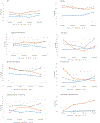Symptom burden among older breast cancer survivors: The Thinking and Living With Cancer (TLC) study
- PMID: 31860135
- PMCID: PMC7255412
- DOI: 10.1002/cncr.32663
Symptom burden among older breast cancer survivors: The Thinking and Living With Cancer (TLC) study
Abstract
Background: Little is known about longitudinal symptom burden, its consequences for well-being, and whether lifestyle moderates the burden in older survivors.
Methods: The authors report on 36-month data from survivors aged ≥60 years with newly diagnosed, nonmetastatic breast cancer and noncancer controls recruited from August 2010 through June 2016. Symptom burden was measured as the sum of self-reported symptoms/diseases as follows: pain (yes or no), fatigue (on the Functional Assessment of Cancer Therapy [FACT]-Fatigue scale), cognitive (on the FACT-Cognitive scale), sleep problems (yes or no), depression (on the Center for Epidemiologic Studies Depression scale), anxiety (on the State-Trait Anxiety Inventory), and cardiac problems and neuropathy (yes or no). Well-being was measured using the FACT-General scale, with scores from 0 to 100. Lifestyle included smoking, alcohol use, body mass index, physical activity, and leisure activities. Mixed models assessed relations between treatment group (chemotherapy with or without hormone therapy, hormone therapy only, and controls) and symptom burden, lifestyle, and covariates. Separate models tested the effects of fluctuations in symptom burden and lifestyle on function.
Results: All groups reported high baseline symptoms, and levels remained high over time; differences between survivors and controls were most notable for cognitive and sleep problems, anxiety, and neuropathy. The adjusted burden score was highest among chemotherapy-exposed survivors, followed by hormone therapy-exposed survivors versus controls (P < .001). The burden score was related to physical, emotional, and functional well-being (eg, survivors with lower vs higher burden scores had 12.4-point higher physical well-being scores). The composite lifestyle score was not related to symptom burden or well-being, but physical activity was significantly associated with each outcome (P < .005).
Conclusions: Cancer and its treatments are associated with a higher level of actionable symptoms and greater loss of well-being over time in older breast cancer survivors than in comparable noncancer populations, suggesting the need for surveillance and opportunities for intervention.
Keywords: breast cancer; older patients; survivorship; symptom burden; well-being.
© 2019 American Cancer Society.
Conflict of interest statement
There are no relevant conflicts of interest.
Figures



Similar articles
-
Comparison of fatigue and fatigability correlates in Korean breast cancer survivors and differences in associations with anxiety, depression, sleep disturbance, and endocrine symptoms: a randomized controlled trial.BMC Cancer. 2021 Jul 26;21(1):855. doi: 10.1186/s12885-021-08575-0. BMC Cancer. 2021. PMID: 34311713 Free PMC article.
-
Pretreatment Psychoneurological Symptoms and Their Association With Longitudinal Cognitive Function and Quality of Life in Older Breast Cancer Survivors.J Pain Symptom Manage. 2019 Mar;57(3):596-606. doi: 10.1016/j.jpainsymman.2018.11.015. Epub 2018 Nov 23. J Pain Symptom Manage. 2019. PMID: 30472317 Free PMC article.
-
Cognitive function prior to systemic therapy and subsequent well-being in older breast cancer survivors: Longitudinal findings from the Thinking and Living with Cancer Study.Psychooncology. 2020 Jun;29(6):1051-1059. doi: 10.1002/pon.5376. Epub 2020 Mar 17. Psychooncology. 2020. PMID: 32154959 Free PMC article.
-
Cancer-related Fatigue in Breast Cancer Survivors: A Review.Clin Breast Cancer. 2021 Feb;21(1):10-25. doi: 10.1016/j.clbc.2020.07.011. Epub 2020 Jul 24. Clin Breast Cancer. 2021. PMID: 32819836 Review.
-
Physical activity intervention benefits persist months post-intervention: randomized trial in breast cancer survivors.J Cancer Surviv. 2023 Dec;17(6):1834-1846. doi: 10.1007/s11764-022-01329-2. Epub 2023 Feb 1. J Cancer Surviv. 2023. PMID: 36723801 Review.
Cited by
-
A nationally representative study of aerobic activity and strength training in older cancer survivors and their psychological distress and sleep difficulties.Support Care Cancer. 2022 Nov;30(11):9597-9605. doi: 10.1007/s00520-022-07370-2. Epub 2022 Sep 29. Support Care Cancer. 2022. PMID: 36171399
-
Impact of taxane-based chemotherapy among older women with breast cancer on cognition and quality of life: a longitudinal pooled analysis.Breast Cancer Res Treat. 2022 Jan;191(2):459-469. doi: 10.1007/s10549-021-06455-6. Epub 2021 Nov 24. Breast Cancer Res Treat. 2022. PMID: 34817750 Free PMC article.
-
Cognitive Dysfunction in Older Breast Cancer Survivors: An Integrative Review.Cancer Nurs. 2022 Jan-Feb 01;45(1):E162-E178. doi: 10.1097/NCC.0000000000000896. Cancer Nurs. 2022. PMID: 34870942 Free PMC article. Review.
-
Plasma levels of interleukin-6 mediate neurocognitive performance in older breast cancer survivors: The Thinking and Living With Cancer study.Cancer. 2023 Aug 1;129(15):2409-2421. doi: 10.1002/cncr.34784. Epub 2023 Apr 25. Cancer. 2023. PMID: 37096888 Free PMC article.
-
The Efficacy of Reminiscence Therapy in Cancer-Related Symptom Management: A Systematic Review and Meta-Analysis.Integr Cancer Ther. 2023 Jan-Dec;22:15347354221147499. doi: 10.1177/15347354221147499. Integr Cancer Ther. 2023. PMID: 36625232 Free PMC article.
References
-
- Carver JR, Shapiro CL, Ng A, et al.: American Society of Clinical Oncology clinical evidence review on the ongoing care of adult cancer survivors: cardiac and pulmonary late effects. J Clin Oncol 25:3991–4008, 2007 - PubMed
Publication types
MeSH terms
Substances
Grants and funding
- T32 CA117865/CA/NCI NIH HHS/United States
- P30 CA008748/CA/NCI NIH HHS/United States
- R01 CA129769/CA/NCI NIH HHS/United States
- R01 CA214647/CA/NCI NIH HHS/United States
- F31 CA220964/CA/NCI NIH HHS/United States
- R35 CA197289/CA/NCI NIH HHS/United States
- EP-D-17-023/EPA/EPA/United States
- U54 CA137788/CA/NCI NIH HHS/United States
- R01 CA219389/CA/NCI NIH HHS/United States
- R01 CA164109/CA/NCI NIH HHS/United States
- EP-C-17-023/EPA/EPA/United States
- R01 CA172119/CA/NCI NIH HHS/United States
- U54 CA132378/CA/NCI NIH HHS/United States
- P30 CA051008/CA/NCI NIH HHS/United States
LinkOut - more resources
Full Text Sources
Medical

